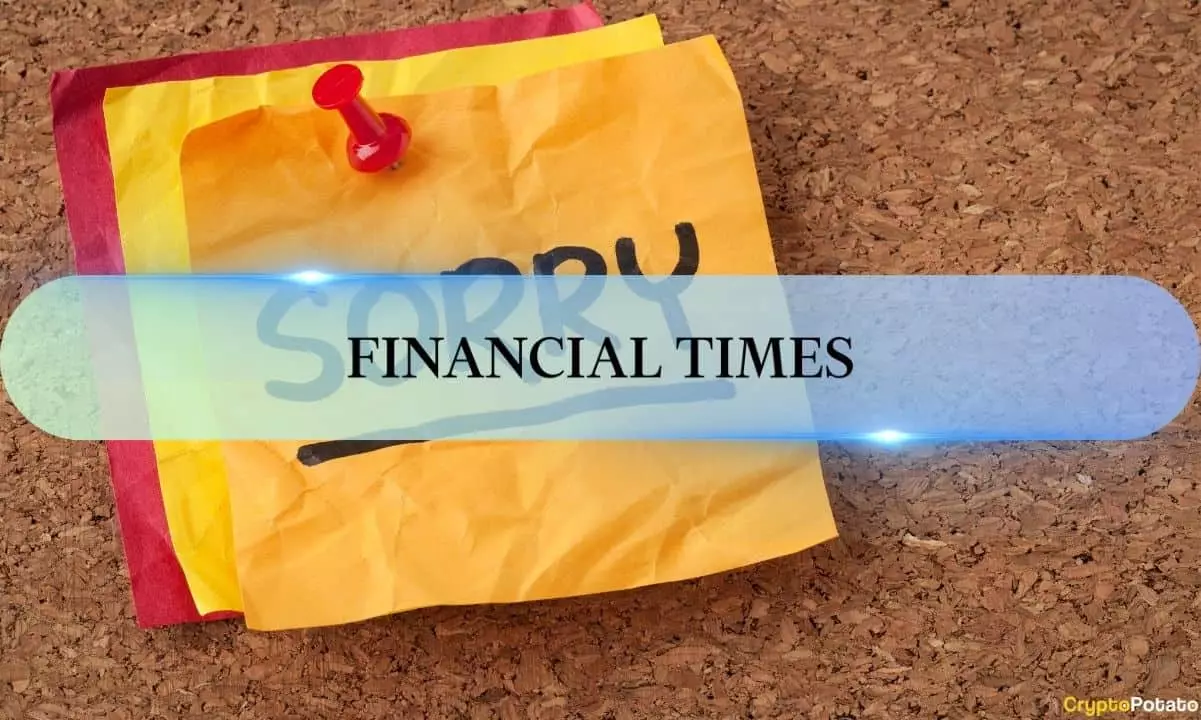On December 5, 2024, a notable shift occurred in the financial landscape as Bitcoin surpassed the $100,000 mark, prompting a response from The Financial Times (FT) that many viewed as controversial. The publication, known for its acute skepticism towards cryptocurrencies, particularly Bitcoin, issued an “apology” through its FT Alphaville platform—a space typically reserved for incisive financial commentary. This reaction was not just a poorly conceived acknowledgment but an intricate mix of sarcasm and self-preservation, reflecting a deeper dive into the ongoing clash between traditional finance and the burgeoning world of digital currencies.
The backdrop of this incident is rich with history; FT has long maintained a critical position on Bitcoin ever since its inception. The publication’s initial skepticism—evident since 2011 when Bitcoin was merely priced at $15.90—has grown into a formidable narrative that framed the cryptocurrency as a speculative bubble. The apology was essentially a recognition of how that rhetoric may have influenced some readers to shy away from investing in a rapidly appreciating asset. Notably, FT’s article, penned by City Editor Bryce Elder, expressed a half-hearted contrition that seemed to mask a deeper disdain for the very underpinnings of cryptocurrencies.
The phrasing within the FT’s apology has stirred skepticism rather than reconciliation among cryptocurrency advocates. Elder’s statement, while appearing to empathize with those “who chose based on our coverage,” swiftly transitioned into a pointed critique of traditional finance, suggesting that readers could misinterpret skepticism towards Bitcoin as endorsement of the conventional financial systems (tradfi) preferred by FT. This mixed messaging has been branded as a “Cope-Pology” by many on social media platforms, illustrating the disconnection between the publication and its audience regarding the cryptocurrency’s status.
The essence of the apology feels disjointed; while it acknowledges the failure to predict Bitcoin’s meteoric rise, it simultaneously clings to a self-righteous stance regarding past critiques. It’s akin to an admission of being wrong, but with caveats that downplay the significance of that error. The specificity with which FT reiterated its prior critical assessments raises questions. By reinforcing its previous positions and labeling Bitcoin as a “negative-sum game,” FT seems to showcase an unwillingness to fully embrace a shift in perspective that some financial institutions are beginning to adopt.
Responses from the crypto community have reflected disappointment, moving beyond mere disbelief to outright anger. Critics have not just dismissed the publication for its perceived lack of humility; they have called for accountability and an honest recognition of previous misjudgments. The question arises: what does it take for traditional financial institutions to accurately interpret the financial innovations ignited by cryptocurrencies? The FT’s attempt at an apology without a show of genuine understanding leaves many unconvinced.
Bitcoin enthusiasts see FT’s rhetoric as indicative of a larger reluctance within parts of the financial media to adapt to the evolving landscape of finance. A notable instance of this clash occurred as early as 2014, when one of the publications critiqued Bitcoin’s anonymous creator, Satoshi Nakamoto, likening the decision-making behind Bitcoin’s immutable supply to reckless medical practices devoid of patient consideration. Such callbacks to earlier warnings only deepen the rift between the crypto community and traditional financial discourse.
As we move forward, it’s essential to consider what a sincere reconciliation between traditional finance and the cryptocurrency realm might look like. The ongoing debate reflects more than just a clash of ideologies; it touches the very nature of how we perceive value and investment. The Financial Times’ fumbled attempt at an apology could serve as a turning point, but only if it leads to a more thoughtful engagement with the changing realities of financial technology.
For institutions like FT, the challenge will be to balance skepticism with a willingness to learn. As the cryptocurrency market continues to mature, so too must the narratives constructed around it. An authentic dialogue rooted in mutual understanding could pave the way for a more integrated financial future, one that acknowledges the merits—and the pitfalls—of both traditional and digital assets. Only then can we hope for a truly nurturing financial ecosystem, where innovation does not thrive in opposition but rather alongside established systems.

